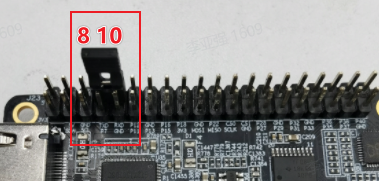3.3.4 UART_usage
RDK X3 enables UART3 by default on the 40-pin connector, with physical pin numbers 8 and 10, and IO voltage of 3.3V.
RDK Ultra enables UART2 by default on the 40-pin connector, with physical pin numbers 8 and 10, and IO voltage of 3.3V.
Refer to /app/40pin_samples/test_serial.py for detailed information on how to use the serial port.
Loopback test
Connect TXD and RXD in hardware, then run the test program to perform write and read operations. The expected result is that the read data should be exactly the same as the written data.
Hardware connection
Connect TXD and RXD together directly on the hardware using a jumper cap.

Test procedure
- Run
python3 /app/40pin_samples/test_serial.py - From the printed serial devices (where
/dev/ttyS0is the system debugging port and it is not recommended to test it unless you fully understand its purpose), select the bus number and the chip number as input options. For example, select/dev/ttyS3for testing, press Enter to confirm, and enter the baud rate parameter:
List of enabled UART:
/dev/ttyS0 /dev/ttyS1 /dev/ttyS3 /dev/ttyUSB0
Please enter the name of the serial port to be tested:/dev/ttyS3
Please enter the baud rate (9600,19200,38400,57600,115200,921600):921600
Serial<id=0x7f819dcac0, open=True>(port='/dev/ttyS3', baudrate=921600, bytesize=8, parity='N', stopbits=1, timeout=1, xonxoff=False, rtscts=False, dsrdtr=False)
- After the program runs correctly, it will continuously print
Send: AA55andRecv: AA55:
Starting demo now! Press CTRL+C to exit
Send: AA55
Recv: AA55
Test code
#!/usr/bin/env python3
import sys
import os
import time
# Import Python serial library
import serial
import serial.tools.list_ports
def serialTest():
print("List of enabled UART:")
os.system('ls /dev/tty[a-zA-Z]*')
uart_dev = input("Please enter the name of the serial port device to test:")
baudrate = input("Please enter the baud rate (9600,19200,38400,57600,115200,921600):")
try:
ser = serial.Serial(uart_dev, int(baudrate), timeout=1) # 1s timeout
except Exception as e:
print("Open serial failed!\n")
print(ser)
print("Starting demo now! Press CTRL+C to exit")
while True:
test_data = "AA55"
write_num = ser.write(test_data.encode('UTF-8'))
print("Send: ", test_data)
received_data = ser.read(write_num).decode('UTF-8')
print("Recv: ", received_data)
time.sleep(1)
ser.close()
return 0
if __name__ == '__main__':
if serialTest() != 0:
print("Serial test failed!")
else:
print("Serial test success!")